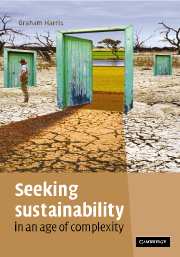Book contents
- Frontmatter
- Contents
- Acknowledgements
- 1 Preamble: the world we are in
- 2 Complexity and complex systems
- 3 New science, new tools, new challenges
- 4 The complexity of ecology
- 5 The generation of complexity
- 6 Micro-interactions and macro-constraints
- 7 A sense of place
- 8 Created landscapes and our changing sense of place
- 9 Catchment form and function
- 10 Catchment loads: ecosystem impacts
- 11 Change detection, monitoring and prediction
- 12 Evidence, uncertainty and risk
- 13 Modified landscapes: biodiversity
- 14 Function in fragmented landscapes
- 15 Environmental flows
- 16 Evidence for global change
- 17 Values and beliefs
- 18 Managing environmental, social and economic systems
- 19 Linking multiple capitals in a changing world
- 20 Community, capacity, collaboration and innovation
- 21 A new environmental paradigm
- 22 Emergent problems and emerging solutions: developing an ‘ecolophysics’?
- 23 Avoiding collapse
- Index
23 - Avoiding collapse
Published online by Cambridge University Press: 21 March 2011
- Frontmatter
- Contents
- Acknowledgements
- 1 Preamble: the world we are in
- 2 Complexity and complex systems
- 3 New science, new tools, new challenges
- 4 The complexity of ecology
- 5 The generation of complexity
- 6 Micro-interactions and macro-constraints
- 7 A sense of place
- 8 Created landscapes and our changing sense of place
- 9 Catchment form and function
- 10 Catchment loads: ecosystem impacts
- 11 Change detection, monitoring and prediction
- 12 Evidence, uncertainty and risk
- 13 Modified landscapes: biodiversity
- 14 Function in fragmented landscapes
- 15 Environmental flows
- 16 Evidence for global change
- 17 Values and beliefs
- 18 Managing environmental, social and economic systems
- 19 Linking multiple capitals in a changing world
- 20 Community, capacity, collaboration and innovation
- 21 A new environmental paradigm
- 22 Emergent problems and emerging solutions: developing an ‘ecolophysics’?
- 23 Avoiding collapse
- Index
Summary
The ‘fourth way’ of recursive complexity and uncertainty: a richer debate about emergence, resilience and constraints, and about complexity, capacity and institutions.
In his recent book Collapse, Jared Diamond has looked at the fates of many previous human societies. Many societies have failed in the past because of environmental problems, but some have survived for long periods by being cognisant of, and responding to, environmental constraints. Whatever we face as a result of our unprecedented interconnection with the natural world, complacency is not a good strategy under the present circumstances. Diamond catalogues the reasons for failure:
Failure to anticipate the impending environmental collapse because of surprise, an incorrect sense of place or other unexpected ecological interactions,
Failure to perceive imminent changes because of slow or imperceptible change, or a lack of evidence, or a disagreement about what constituted evidence (there is a lesson here about climate change),
The application of apparently rational behaviour, often arising from the ‘tragedy of the commons’,
Irrational behaviour, greed, poor decisions and denial,
The application of unsuccessful solutions.
Many of these we have discussed here; the reasons for the past collapses of human societies are still with us. We are the first generation to realise the true nature and magnitude of regional and global constraints. The present nexus of increasing population, energy and resource demands, climate change and biodiversity loss, together with changing network architectures, increases the risks. Ecological surprise, hysteresis effects, uncertainty and debates about evidence are characteristic of the complex, non-linear world in which we live.
- Type
- Chapter
- Information
- Seeking Sustainability in an Age of Complexity , pp. 328 - 348Publisher: Cambridge University PressPrint publication year: 2007



